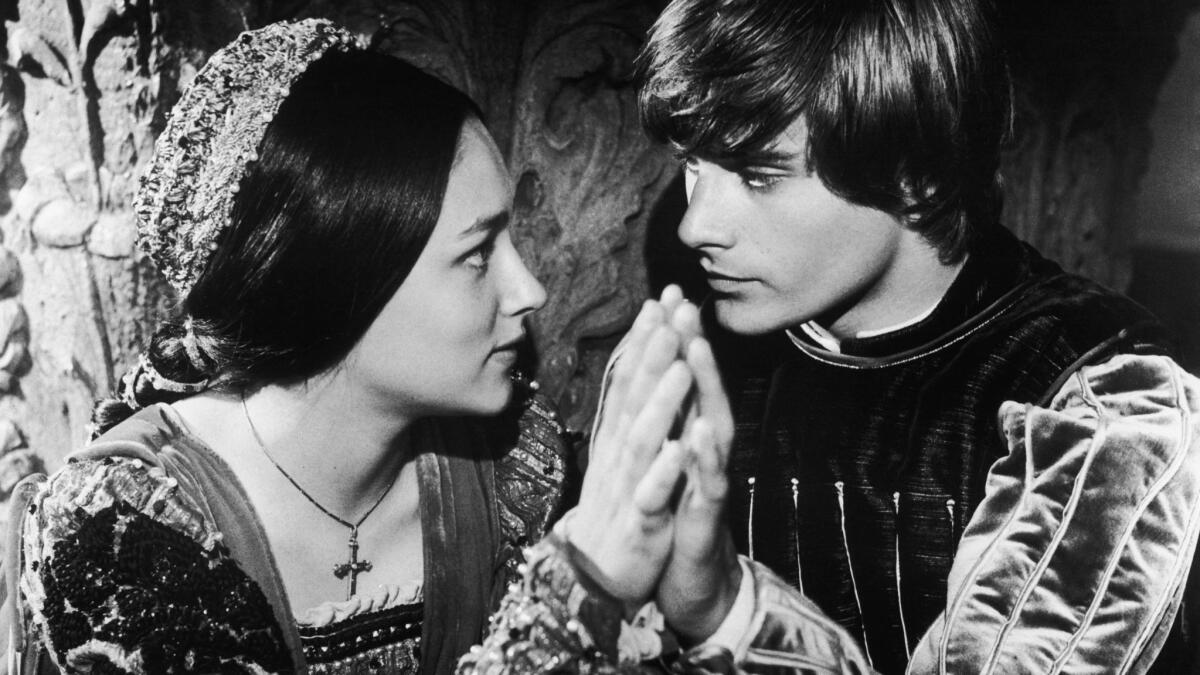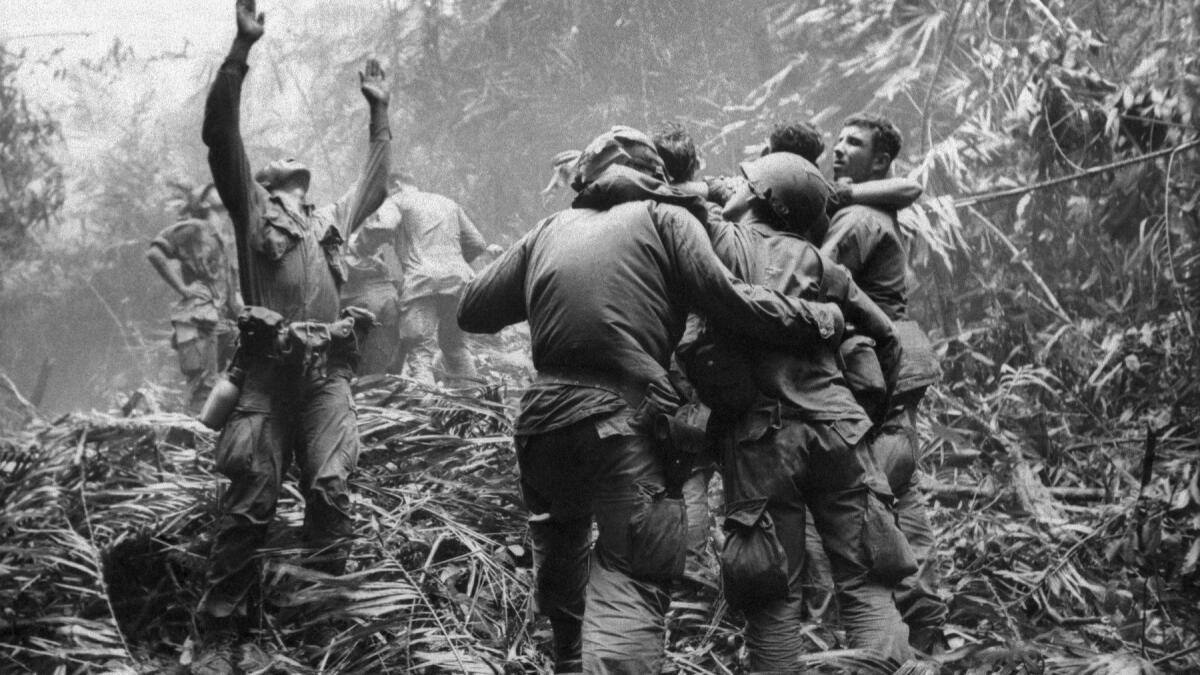Rage and wonder in 1968: The year war came through the TV and I felt pieces of childhood ending
- Share via
I was 9 years old. My father was at war.
I watched Vietnam every night on TV, wind blowing through the tall grass of a distant land, numbers of the fallen flashing on the screen, all in black and white, a war in two colors, scary and real in my living room, ticking away in the hour before the latest rerun of “Sea Hunt,” my favorite show, even though I knew then, as a boy, that pretend things didn’t last in a world coming undone.
1968. The number is like family. It was the year I felt pieces of childhood ending. Much of what was going on was hard to understand. But there were moments of sublime and terrible clarity: The Rev. Martin Luther King Jr. dead, Bobby Kennedy dead, cities ablaze, streets filled with peace signs, placards and rage; the Beatles’ “Helter Skelter” rising from the stereo, and in the movie house by the bowling alley, “2001: A Space Odyssey” played sinister magic with the great beyond.
READ MORE: A look back at entertainment in 1968 »
You’d come home or go to a friend’s house, and there’d be ladies weeping around TVs, frightened and sad about Vietnam, assassinations, riots, hippies, drugs, police dogs, free sex and all the things that disrupted lives once tidy. It was exhilarating. And it was all there in the trippy “Yellow Submarine” movie poster, the flying hair and bruised howls of Janis Joplin, and the darker things Joan Didion found in “Slouching Towards Bethlehem,” and the racism laid bare in Eldridge Cleaver’s “Soul on Ice.”
I was too young for such books then, but the larger meanings they distilled were in the air, shaping me. In the library, I saw a copy of Norman Mailer’s “The Armies of the Night,” which I thought was about soldiers but was really about the antiwar march on the Pentagon and how men and women were being wasted by lies that could no longer be told.
Another day, I heard what Jimi Hendrix could do with a guitar — his cover of Bob Dylan’s “All Along the Watchtower” bursting from the radio in my mother’s Rambler — and thought that art comes from all kinds of places and seeks a home in you. It made me feel the delicious danger and freedom of discovery.
I knew then, as a boy, that pretend things don’t last in a world coming undone.
Every generation has its art, music, literature, crystallizing narratives and mesmerizing forces that define who we are in the space-time continuum. They are sometimes conflated and assigned importance beyond their era. A few do transcend, most do not. But 1968 was the beginning of my long coming of age, my realization that the world beyond my backyard, beyond the church confessional and the sacred host held high, beyond the base pool and the officers’ commissary, carried secrets and truths as mysterious and beautiful as constellations.
I could feel it hunting eels in storm pipes with my best friend, Matt Bose, reading letters from my father in Vietnam, watching Teddy Kennedy’s eulogy for his slain brother Bobby, staring at innocence and tragedy in Franco Zeffirelli’s production of “Romeo and Juliet,” and hearing this: “and when he shall die, take him and cut him out in little stars, and he will make the face of heaven so fine that all the world will be in love with night.”
I had not known Shakespeare until then. I did not know words could do such things. I did not understand all of them — the subtleties would reveal themselves in time — but I was startled at the wonder of how words could make you feel the sting and sorrow of forbidden love. I decided to be a writer, and marry Juliet, or more precisely the actress who played her, Olivia Hussey. But I wore a clip-on tie, hauled around a Batman lunchbox and was bad at arithmetic. I was doomed.

And when he shall die, take him and cut him out in little stars, and he will make the face of heaven so fine that all the world will be in love with night.
— “Romeo and Juliet,” Shakespeare
I kept an eye on headlines, though, bold and ominous, and one day saw the picture of John Carlos and Tommie Smith raising their black-gloved fists on the medal podium at the Olympics in Mexico City. It was fierce and brave, a defiant act against the racism of the country whose flag they stood beneath. It moved and scared me. What was happening to my land? Someone had shaken loose all the sins and no one knew the way out of the storm.
Cleaver’s “Soul on Ice” spoke eloquently to the legacy of slavery and oppression. The book, a collection of essays written from Folsom Prison, tells how Cleaver, who would go on to be a leader in the Black Panthers, had raped white women as a perverse insurrection against the systemic brutality done to his race. It was piercing and honest and at times filled with the belief that even a ruined man could find renewal.
“And why does it make you sad to see how everything hangs by such thin and whimsical threads? Because you’re a dreamer, an incredible dreamer, with a tiny spark hidden somewhere inside you which cannot die, which even you cannot kill or quench and which tortures you horribly because all the odds are against its continual burning. In the midst of the foulest decay and putrid savagery, this spark speaks to you of beauty, of human warmth and kindness, of goodness, of greatness, of heroism, of martyrdom, and it speaks to you of love.”

One day I asked him: ‘Did you kill anyone?’
Images flowed in restless rivers out of our Zenith television set. TV was the oracle. It was what radio was to my grandparents and what the internet would be to my children, a magic portal to the majestic and the horrible. A boy of 9 could see the big, big world, peek in on “Peyton Place,” be aroused and confused by “Rowan & Martin’s Laugh-In,” shoot imaginary cowboy pistols at “Bonanza” and watch Walter Cronkite sit at his desk with his maps and B-roll and, in a voice as familiar as your own echo, tell you what you needed to know.
“To say that we are closer to victory today,” he said, in a commentary that shook middle America’s notion of the Vietnam War, “is to believe, in the face of the evidence, the optimists who have been wrong in the past. To suggest we are on the edge of defeat is to yield to unreasonable pessimism. To say that we are mired in stalemate seems the only realistic, yet unsatisfactory, conclusion.”
Nobody liked a stalemate. The air bristled with one epoch colliding with another. Eyes alight, batons, fires and tear gas, all moving in a great devouring swirl. The 1967 march on the Pentagon — the building that sent my father to war — seethed with the venom against a government no longer trusted by a generation unbound. Mailer, a scrappy writer with immense ego and bullish insight, was an ideal voice for the chaos and cracked mirror of a nation when he published “The Armies of the Night” a year later.
TV was the oracle. It was what radio was to my grandparents and what the internet would be to my children, a magic portal to the majestic and the horrible.
“The new generation believed in technology more than any before it, but the generation also believed in LSD, in witches, in tribal knowledge, in orgy, and revolution. It had no respect whatsoever for the unassailable logic of the next step: belief was reserved for the revelatory mystery of the happening where you did not know what was going to happen next; that was what was good about it. Their radicalism was in their hate for authority — the authority was the manifest evil of this generation.”
It was all around me, incomprehensible yet indivisible. I felt like a boy spying through keyholes on a ferocious world pressing closer. “Senator Kennedy has been shot. Is that possible? Oh, my God.” That’s how things came at you, on the TV, in fuzzy, haunting shades of gray. You could feel your bones move. Just like they did that morning the phone rang and we got dressed up and hurried to the airport. The plane’s wings flashed silver and white. The engines stopped whirring and the door opened.
My father had come home from war. He descended in sunlight. I studied him, this man I hardly knew. He was thinner. His eyes were wet. I kept glancing at him on the ride home. The line of his jaw, his hands on the wheel; a ghost made flesh. There are times in a son’s life when he wonders where his own path will lead, what he will carry to the edge of wherever he is going. One day I asked him:
“Did you kill anyone?”
My father didn’t answer. He cooked burgers and steaks on the grill. Grease hissed and wisps rose from charcoal and vanished. It seemed for a moment that things were as they should be; the scent of mown grass, kids yelling from other yards. But they weren’t. They’d never be the same. Not the country. Not the headlines. Not books written, not songs sung. Not all the words out there in rage and fury. Not all the prayers and hymns of protest, not the false prophets nor the true believers. Nothing would be the same.
Not even me.
More on the cultural shifts of 1968:
Days of rage and wonder: Full coverage of 1968’s cultural changes
‘The Mod Squad,’ ‘Adam-12’ and how TV brought the counterculture into 1968’s cop shows
When pop music got big: 1968 and the birth of arena rock
California Sounds 1968: 10 essential Los Angeles-infused records from a kaleidoscopic era
A timeline of anger, grief and change
Author Todd Gitlin on how to remember 1968
Twitter: @JeffreyLAT
More to Read
Only good movies
Get the Indie Focus newsletter, Mark Olsen's weekly guide to the world of cinema.
You may occasionally receive promotional content from the Los Angeles Times.











